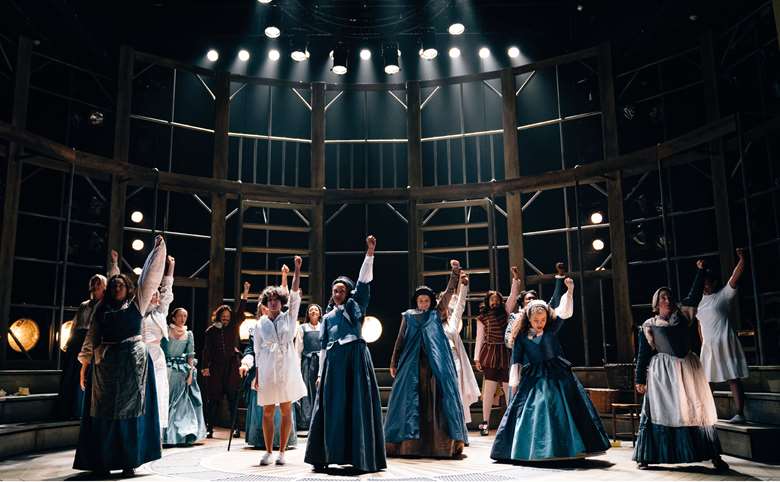Play for performance: Emilia
Rafaella Marcus
Tuesday, October 1, 2019
Each issue of D&T we bring you a page-to-stage focus on a play for performance with your students, written by someone who has directed it themselves. This issue, Rafaella Marcus introduces the raw female rage of Emilia

HELEN MURRAY
Emilia is the story of poet, writer, teacher, and proto-feminist voice of the 17th century, Emilia Bassano (later Lanier) – and one of the first women to have her poetry published in England. Morgan Lloyd Malcolm's play takes Emilia's story and uses it as a call to arms, rejecting the injustice of women across the centuries who have been silenced, abused, and neglected by history.
Over the course of writing, the play grew from a straightforward historical account into something much bolder and more contemporary: it is not a naturalistic depiction of Elizabethan England but takes place in a theatrical dream landscape where the 17th and 21st centuries intersect. The biggest decision was to have the role of Emilia played by three actors: Morgan's aim is to break apart the hierarchy of having a single lead. Emilia requires a strong ensemble of actors. In a cast of thirteen, as the original production had, almost everyone played multiple roles, ranging from cameos to the women and men who shaped Emilia's life.
In casting the play, you are invited to subvert typical historical storytelling, and cast those that you might not usually see in a period piece, since it is not just a play about white women's struggles, but about the struggles of a woman of colour who faced racism as well as sexism. If you find it impossible to cast diversely in your school or organisation, think about other ways you can make your approach to the play intersectional: cast against type, be surprising, be bold. There is rich comedy and wit to be found in the all-female cast: the burlesquing and sending up of the men in Emilia's life is a sharp weapon of critique, but it is also joyful to see female performers swaggering and taking up space.
Morgan's play was written for the Globe, but there are many ways that you can bring qualities of that theatre into your space. The design for the West End transfer used wood as its primary material, and circles throughout the architecture, mimicking the wooden O of the Globe. The play is self-consciously theatrical – like a Shakespeare play, there is no fourth wall, with Emilia 3 talking to the audience throughout and lots of scope for asides and audience interaction. We found ways of heightening that feeling in the Vaudeville Theatre by using its natural architecture: sumptuous blue curtains that opened to reveal the ensemble singing, staging scenes in the boxes, characters entering from the auditorium.
Music and movement are integral to the play, and the original production contained a number of dances and movement sequences. With stage directions like ‘Court life. MUSIC. Men arrive. They’re on the prowl’, lean into the freedom that its theatricality affords you and use the ensemble (the Muses) to create Emilia's world as you see fit.
Emilia should not be a rant or a polemic: it is full of wit, joy, silliness, and sorrow, as well as anger. However, anger is vital to the play: the final speech is an opportunity to light a fire in the audiences’ bellies, and this is what it requires from the actor as well.
Clare Perkins, the original Emilia 3, prepared by rehearsing it in wide open spaces and sending the words as far as she could, pulling them up from the pit of her stomach. The speech is both deeply felt and precisely argued, a combination of head, heart and guts.
Emilia is an extraordinary play for young people, especially young women, to perform. Not only is it about using your voice to name and fight injustice, but there is something very potent and liberating in giving female performers the opportunity to play roles outside the norm. The play depicts harrowing moments and events, which may be especially affecting for women; be mindful of the welfare of your cast in rehearsal. It is an emotional play to realise, and this is a strength, not a weakness. Make space for sharing and reflection: Emilia was fighting for her right to be heard, and we tried to bring that into the process as well as the production.

